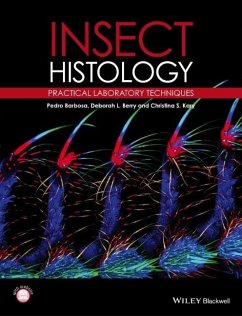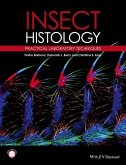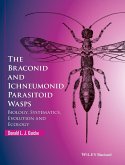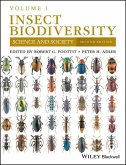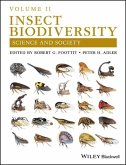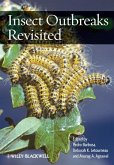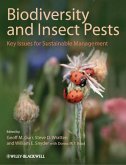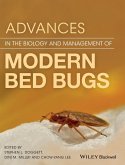- Gebundenes Buch
- Merkliste
- Auf die Merkliste
- Bewerten Bewerten
- Teilen
- Produkt teilen
- Produkterinnerung
- Produkterinnerung
This title is a much needed update of Barbosa's self-published Manual of Basic Techniques in Insect Histology. It is a laboratory manual of 'traditional' and 'modern' insect histology techniques, completely revised using cutting-edge methodology carried out today and includes new immunohistochemical techniques not previously looked at.
Insect Histology is designed as a resource for student and professional researchers, in academia and industry, who require basic information on the procedures that are essential for the histological display of the tissues of insects and related organisms.
Andere Kunden interessierten sich auch für
![Insect Histology Insect Histology]() Pedro BarbosaInsect Histology138,99 €
Pedro BarbosaInsect Histology138,99 €![The Braconid and Ichneumonid Parasitoid Wasps The Braconid and Ichneumonid Parasitoid Wasps]() Donald L. J. QuickeThe Braconid and Ichneumonid Parasitoid Wasps264,99 €
Donald L. J. QuickeThe Braconid and Ichneumonid Parasitoid Wasps264,99 €![Insect Biodiversity Insect Biodiversity]() Robert G. FoottitInsect Biodiversity150,99 €
Robert G. FoottitInsect Biodiversity150,99 €![Insect Biodiversity Insect Biodiversity]() Insect Biodiversity175,99 €
Insect Biodiversity175,99 €![Insect Outbreaks Revisited Insect Outbreaks Revisited]() Insect Outbreaks Revisited171,99 €
Insect Outbreaks Revisited171,99 €![Biodiversity and Insect Pests Biodiversity and Insect Pests]() Biodiversity and Insect Pests175,99 €
Biodiversity and Insect Pests175,99 €![Advances in the Biology and Management of Modern Bed Bugs Advances in the Biology and Management of Modern Bed Bugs]() Advances in the Biology and Management of Modern Bed Bugs148,99 €
Advances in the Biology and Management of Modern Bed Bugs148,99 €-
-
-
This title is a much needed update of Barbosa's self-published Manual of Basic Techniques in Insect Histology. It is a laboratory manual of 'traditional' and 'modern' insect histology techniques, completely revised using cutting-edge methodology carried out today and includes new immunohistochemical techniques not previously looked at.
Insect Histology is designed as a resource for student and professional researchers, in academia and industry, who require basic information on the procedures that are essential for the histological display of the tissues of insects and related organisms.
Hinweis: Dieser Artikel kann nur an eine deutsche Lieferadresse ausgeliefert werden.
Insect Histology is designed as a resource for student and professional researchers, in academia and industry, who require basic information on the procedures that are essential for the histological display of the tissues of insects and related organisms.
Hinweis: Dieser Artikel kann nur an eine deutsche Lieferadresse ausgeliefert werden.
Produktdetails
- Produktdetails
- Verlag: Wiley & Sons
- 1. Auflage
- Seitenzahl: 368
- Erscheinungstermin: 1. November 2014
- Englisch
- Abmessung: 253mm x 197mm x 25mm
- Gewicht: 1059g
- ISBN-13: 9781444336955
- ISBN-10: 1444336959
- Artikelnr.: 40200544
- Herstellerkennzeichnung
- Libri GmbH
- Europaallee 1
- 36244 Bad Hersfeld
- gpsr@libri.de
- Verlag: Wiley & Sons
- 1. Auflage
- Seitenzahl: 368
- Erscheinungstermin: 1. November 2014
- Englisch
- Abmessung: 253mm x 197mm x 25mm
- Gewicht: 1059g
- ISBN-13: 9781444336955
- ISBN-10: 1444336959
- Artikelnr.: 40200544
- Herstellerkennzeichnung
- Libri GmbH
- Europaallee 1
- 36244 Bad Hersfeld
- gpsr@libri.de
Dr Pedro Barbosa is a Professor Emeritus at the Department of Entomology of the University of Maryland, College Park. He has been a professor at Rutgers University, the University of Massachusetts at Amherst and at the University of Maryland. Although his research focused on the ecology of insects and insect-plant interactions, he also has an interest in insect histology. Since his retirement in 2010 he has written several books on insects. Dr Deborah Berry is Co-Director for the Histopathology and Tissue Shared Resource at the Lombardi Comprehensive Cancer Center, Georgetown University, which provides research pathology support for translational cancer research. She has over 20 years' experience in histology with a specialty in the histology of the fruit fly Drosophila melanogaster. Dr Christina Kary is a scientific editor with the journal Genes & Development at Cold Spring Harbor Laboratory Press, New York. Before becoming an editor, she earned a PhD with Dr Eric Baehrecke at the University of Maryland and was a Jane Coffin Childs post-doctoral fellow with Dr Susan Mango at Harvard University.
Preface ix
Acknowledgements xi
Introduction xiii
About the companion website xiv
1 Problems of sclerotized chitin: Softening insect cuticle 1
1.1 Introduction 1
1.2 General Methods 3
1.3 Preparations of insect eggs 14
1.4 Double Embedding Techniques 16
References 19
2 Fixation 21
2.1 Introduction 21
2.2 Aldehyde based fixatives 21
2.3 Protein denaturing 30
2.4 Picric acid based 33
2.5 Mercuric chloride based 37
2.6 SEM/TEM 40
2.7 Other 46
References 51
3 Dehydrating, clearing, and embedding 54
3.1 Dehydration 54
3.2 Clearing 60
3.3 Embedding General 65
3.4 Embedding - Ester Wax 73
3.5 Embedding - Methacrylate 74
References 77
4 Staining 79
4.1 Single-contrast staining - Carmines 81
4.2 Single contrast staining - Nuclear Stains 83
4.3 Single contrast staining - General Stains 86
4.4 Single contrast staining - Golgi 89
4.5 Single contrast staining - Eggs 89
4.6 Single contrast staining - Silver Stains 90
4.7 Polychrome staining techniques - General 92
4.8 Polychrome staining - Brain/Nerve 102
4.9 Polychrome staining - blood 103
4.10 Single contrast procedures for chitinous material 105
4.11 Polychrome staining procedures for chitinous material 106
4.12 Polychrome staining for chitinous material - KOH 110
4.13 Polychrome staining for chitinous material - Differential staining of
Individual Organs 111
4.14 Staining of specific tissues 113
4.15 Two dye combinations 114
References 117
5 Immunohistochemical techniques 119
5.1 Introduction 119
5.2 General immunostaining techniques 127
5.3 Immunolabeling of samples for Transmission Electron Microscopy (TEM)
135
5.4 Proliferation assays 140
5.5 Methods to detect specific proteins 142
References 144
6 Use of genetic markers in insect histology 146
6.1 Introduction 146
6.2 Inducible genetic markers 149
6.3 Mosaic gene expression 156
6.4 Fluorescent markers for live imaging and kinetic microscopy 165
References 169
7 Fluorescence 171
7.1 Introduction 171
References 192
8 Mounting 194
8.1 Introduction 194
References 206
9 Preparation of whole mounts 208
9.1 Introduction 208
References 229
10 Preparation of whole mounts for staining 231
10.1 Introduction 231
10.2 Detection of NAPDHd 237
10.3 SEM 238
10.4 In situ hybridization 240
References 244
11 Preparation of genitalia, mouthparts and other body parts 246
References 256
12 Preparation of chromosomes 258
References 288
13 Preparation of other specific insect organs and tissues 290
13.1 Introduction 290
References 323
Appendix Dissecting fluids and saline solutions 325
Index 333
Acknowledgements xi
Introduction xiii
About the companion website xiv
1 Problems of sclerotized chitin: Softening insect cuticle 1
1.1 Introduction 1
1.2 General Methods 3
1.3 Preparations of insect eggs 14
1.4 Double Embedding Techniques 16
References 19
2 Fixation 21
2.1 Introduction 21
2.2 Aldehyde based fixatives 21
2.3 Protein denaturing 30
2.4 Picric acid based 33
2.5 Mercuric chloride based 37
2.6 SEM/TEM 40
2.7 Other 46
References 51
3 Dehydrating, clearing, and embedding 54
3.1 Dehydration 54
3.2 Clearing 60
3.3 Embedding General 65
3.4 Embedding - Ester Wax 73
3.5 Embedding - Methacrylate 74
References 77
4 Staining 79
4.1 Single-contrast staining - Carmines 81
4.2 Single contrast staining - Nuclear Stains 83
4.3 Single contrast staining - General Stains 86
4.4 Single contrast staining - Golgi 89
4.5 Single contrast staining - Eggs 89
4.6 Single contrast staining - Silver Stains 90
4.7 Polychrome staining techniques - General 92
4.8 Polychrome staining - Brain/Nerve 102
4.9 Polychrome staining - blood 103
4.10 Single contrast procedures for chitinous material 105
4.11 Polychrome staining procedures for chitinous material 106
4.12 Polychrome staining for chitinous material - KOH 110
4.13 Polychrome staining for chitinous material - Differential staining of
Individual Organs 111
4.14 Staining of specific tissues 113
4.15 Two dye combinations 114
References 117
5 Immunohistochemical techniques 119
5.1 Introduction 119
5.2 General immunostaining techniques 127
5.3 Immunolabeling of samples for Transmission Electron Microscopy (TEM)
135
5.4 Proliferation assays 140
5.5 Methods to detect specific proteins 142
References 144
6 Use of genetic markers in insect histology 146
6.1 Introduction 146
6.2 Inducible genetic markers 149
6.3 Mosaic gene expression 156
6.4 Fluorescent markers for live imaging and kinetic microscopy 165
References 169
7 Fluorescence 171
7.1 Introduction 171
References 192
8 Mounting 194
8.1 Introduction 194
References 206
9 Preparation of whole mounts 208
9.1 Introduction 208
References 229
10 Preparation of whole mounts for staining 231
10.1 Introduction 231
10.2 Detection of NAPDHd 237
10.3 SEM 238
10.4 In situ hybridization 240
References 244
11 Preparation of genitalia, mouthparts and other body parts 246
References 256
12 Preparation of chromosomes 258
References 288
13 Preparation of other specific insect organs and tissues 290
13.1 Introduction 290
References 323
Appendix Dissecting fluids and saline solutions 325
Index 333
Preface ix
Acknowledgements xi
Introduction xiii
About the companion website xiv
1 Problems of sclerotized chitin: Softening insect cuticle 1
1.1 Introduction 1
1.2 General Methods 3
1.3 Preparations of insect eggs 14
1.4 Double Embedding Techniques 16
References 19
2 Fixation 21
2.1 Introduction 21
2.2 Aldehyde based fixatives 21
2.3 Protein denaturing 30
2.4 Picric acid based 33
2.5 Mercuric chloride based 37
2.6 SEM/TEM 40
2.7 Other 46
References 51
3 Dehydrating, clearing, and embedding 54
3.1 Dehydration 54
3.2 Clearing 60
3.3 Embedding General 65
3.4 Embedding - Ester Wax 73
3.5 Embedding - Methacrylate 74
References 77
4 Staining 79
4.1 Single-contrast staining - Carmines 81
4.2 Single contrast staining - Nuclear Stains 83
4.3 Single contrast staining - General Stains 86
4.4 Single contrast staining - Golgi 89
4.5 Single contrast staining - Eggs 89
4.6 Single contrast staining - Silver Stains 90
4.7 Polychrome staining techniques - General 92
4.8 Polychrome staining - Brain/Nerve 102
4.9 Polychrome staining - blood 103
4.10 Single contrast procedures for chitinous material 105
4.11 Polychrome staining procedures for chitinous material 106
4.12 Polychrome staining for chitinous material - KOH 110
4.13 Polychrome staining for chitinous material - Differential staining of
Individual Organs 111
4.14 Staining of specific tissues 113
4.15 Two dye combinations 114
References 117
5 Immunohistochemical techniques 119
5.1 Introduction 119
5.2 General immunostaining techniques 127
5.3 Immunolabeling of samples for Transmission Electron Microscopy (TEM)
135
5.4 Proliferation assays 140
5.5 Methods to detect specific proteins 142
References 144
6 Use of genetic markers in insect histology 146
6.1 Introduction 146
6.2 Inducible genetic markers 149
6.3 Mosaic gene expression 156
6.4 Fluorescent markers for live imaging and kinetic microscopy 165
References 169
7 Fluorescence 171
7.1 Introduction 171
References 192
8 Mounting 194
8.1 Introduction 194
References 206
9 Preparation of whole mounts 208
9.1 Introduction 208
References 229
10 Preparation of whole mounts for staining 231
10.1 Introduction 231
10.2 Detection of NAPDHd 237
10.3 SEM 238
10.4 In situ hybridization 240
References 244
11 Preparation of genitalia, mouthparts and other body parts 246
References 256
12 Preparation of chromosomes 258
References 288
13 Preparation of other specific insect organs and tissues 290
13.1 Introduction 290
References 323
Appendix Dissecting fluids and saline solutions 325
Index 333
Acknowledgements xi
Introduction xiii
About the companion website xiv
1 Problems of sclerotized chitin: Softening insect cuticle 1
1.1 Introduction 1
1.2 General Methods 3
1.3 Preparations of insect eggs 14
1.4 Double Embedding Techniques 16
References 19
2 Fixation 21
2.1 Introduction 21
2.2 Aldehyde based fixatives 21
2.3 Protein denaturing 30
2.4 Picric acid based 33
2.5 Mercuric chloride based 37
2.6 SEM/TEM 40
2.7 Other 46
References 51
3 Dehydrating, clearing, and embedding 54
3.1 Dehydration 54
3.2 Clearing 60
3.3 Embedding General 65
3.4 Embedding - Ester Wax 73
3.5 Embedding - Methacrylate 74
References 77
4 Staining 79
4.1 Single-contrast staining - Carmines 81
4.2 Single contrast staining - Nuclear Stains 83
4.3 Single contrast staining - General Stains 86
4.4 Single contrast staining - Golgi 89
4.5 Single contrast staining - Eggs 89
4.6 Single contrast staining - Silver Stains 90
4.7 Polychrome staining techniques - General 92
4.8 Polychrome staining - Brain/Nerve 102
4.9 Polychrome staining - blood 103
4.10 Single contrast procedures for chitinous material 105
4.11 Polychrome staining procedures for chitinous material 106
4.12 Polychrome staining for chitinous material - KOH 110
4.13 Polychrome staining for chitinous material - Differential staining of
Individual Organs 111
4.14 Staining of specific tissues 113
4.15 Two dye combinations 114
References 117
5 Immunohistochemical techniques 119
5.1 Introduction 119
5.2 General immunostaining techniques 127
5.3 Immunolabeling of samples for Transmission Electron Microscopy (TEM)
135
5.4 Proliferation assays 140
5.5 Methods to detect specific proteins 142
References 144
6 Use of genetic markers in insect histology 146
6.1 Introduction 146
6.2 Inducible genetic markers 149
6.3 Mosaic gene expression 156
6.4 Fluorescent markers for live imaging and kinetic microscopy 165
References 169
7 Fluorescence 171
7.1 Introduction 171
References 192
8 Mounting 194
8.1 Introduction 194
References 206
9 Preparation of whole mounts 208
9.1 Introduction 208
References 229
10 Preparation of whole mounts for staining 231
10.1 Introduction 231
10.2 Detection of NAPDHd 237
10.3 SEM 238
10.4 In situ hybridization 240
References 244
11 Preparation of genitalia, mouthparts and other body parts 246
References 256
12 Preparation of chromosomes 258
References 288
13 Preparation of other specific insect organs and tissues 290
13.1 Introduction 290
References 323
Appendix Dissecting fluids and saline solutions 325
Index 333

